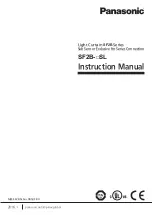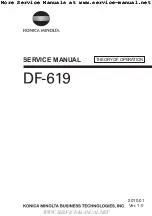
SHOULDER PACEMAKER
TM
- User Manual 04-06EN
5
INTRODUCTION
The shoulder is a very complex joint, mainly stabilized by the coordinated activation of several muscles that keep the joint in position. If this
control system fails, severe dyskinesia, functional restrictions, and instability can occur.
The Shoulder Pacemaker
TM
device is an electrical muscle stimulator, internally powered and used for medical purposes. The device induces
muscle contractions by means of passage of electric current through conductive electrodes positioned on the body areas of interest. The
Shoulder Pacemaker
TM
device can be used to stimulate the shoulder and periscapular musculature in patients with non-physiological muscle-
activation pattern.
Electrostimulation in general is an effective training method for muscles. The Shoulder Pacemaker
TM
is primarily designed to re-educate
patients in terms of their muscle activation pattern. Focus group is rapresented by posterior shoulder instability patients without any structural
defects to bone, tendons, muscles or nerves that merely suffer from a malcoordination of their muscle activation leading to severe instability
symptoms. In this particular patient group preliminary results have been very encouraging (1,2). Furthermore, the Shoulder Pacemaker
TM
device can as well be used in other pathologies including but not limited to preoperative and postoperative muscle strengthening for different
types of shoulder surgery. There is evidence that electrical muscle stimulation treatment has a positive effect on infraspinatus and shoulder
external rotation force production after rotator cuff repair surgery (3) or infraspinatus strength in a non-operative setting as well (4). Even in
reverse shoulder prosthesis preoperative and postoperative muscle strangthening has been shown to improve the clinical outcome (5) making
the application of electrical muscle stimulation in these patients feasible. It would seem that in neurological patients, the benefits of the
electrostimulation could be lower than in the orthopaedic patients as nerve lesions lead to muscle disactivation, atrophy and fatty infiltration
with partial or complete loss of function that can be irreversible. Nonetheless, research has shown that even in patients with hemiparetic or
hemiplegic shoulder pain, subluxation and loss of function due to stroke, electrical muscle stimulation treatment can improve muscle
activation, reduce pain and improve function (6,7,8).
It should be emphasized that not all shoulder disorders can be treated by muscle electrostimulation; the competent doctor is responsible for
selecting the correct indication and treatment based on the extent of the injury and the patient's medical history.
Conventional electrical muscle stimulation imposes a pre-defined rhythm on the users/patients as they need to adapt the speed and timing of
intervals of their motion to the electrical impulse. This limitation is overcome by the Shoulder Pacemaker
TM
device thanks to the fact that the
movements performed by the subject's arm are identified by sensors placed inside the device, and the stimulation is automatically adapted to
the patients motion thus greatly improving the applicability during a dedicated exercise program. The training performed with the Shoulder
Pacemaker
TM
device aimes at automated activation of hypoactive muscle groups during motion with the goal to help the users/patients to
retrain their muscle activation pattern by means of a feed-forward mechanism.
(1) Moroder et al, Use of shoulder pacemaker for treatment of functional shoulder instability, Obere Extremität (2017), 12(2): 103-108
(2)Moroder et al, Shoulder-Pacemaker Treatment Concept for Posterior Positional Functional Shoulder Instability,The American Journal of
Sports Medicine (2020), 48(9): 2097-2104
(3) Reinold et al, The effect of neuromuscular electrical stimulation of the infraspinatus on shoulder external rotation force production after
rotator cuff repair surgery, The American Journal of Sports Medicine (2008), 36(12): 2317-2321
(4) Yanase et al, Electrical Stimulation to the Infraspinatus on Hypertrophy and Strenght of the Shoulder, International Journal of Sports
Medicine (2018), 39(11): 828-834
(5) Uschok et al, Reverse shoulder arthroplasty: the role of physical therapy on the clinical outcome in the mid-term to long-term follow-up,
Archives of Orthopaedic and Trauma Surgery (2018), 138(12): 1647-1652
(6) Jeon et al, The effects of electromyography-triggered electrical stimulation on shoulder subluxation, muscle activation, pain, and function in
persons with stroke: A pilot study, Neurorehabilitation (2017), 40(1): 69-75
(7) Chuang et al, Effect of EMG-triggered neuromuscular electrical stimulation with bilateral arm training on hemiplegic shoulder pain and arm
function after stroke: a randomized controlled trial, Journal of NeuroEngineering and Rehabilitation (2017), 14(1):122
(8) Wilson et al, The effect of Peripheral Nerve Stimulation on Shoulder Biomechanics: A Randomized Controlled Trial in Comparison to Physical
Therapy, American Journal of Physical Medicine & Rehabilitation (2017), 96 (3): 191-198
Summary of Contents for SHOULDER PACEMAKER SPM Series
Page 1: ......






































